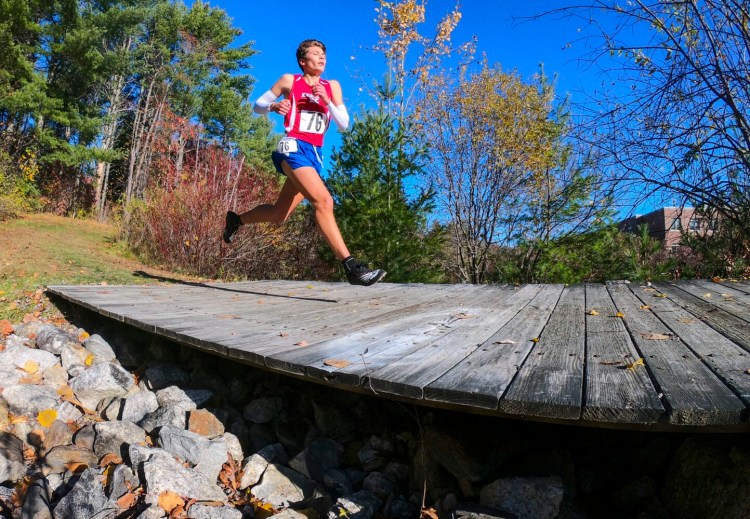Cross country runners got to have a season this fall. It just looked a whole lot different.
There were hardly any fans and supporters at events that normally draw hundreds of people. There were often fewer schools competing. Wave heats broke up the field, and stood in stark contrast to the massive starts that have been a signature of the biggest meets of the year.
“Obviously, it was a different year. It couldn’t be helped otherwise,” Maranacook coach Jay Nutting said. “As much as we tried to make it like any other year, the circumstances and the schedule made it so it wasn’t. It was compressed time and gaps in meets because of school shutdowns. … We tried to keep things as normal as possible, but it wasn’t always doable this year.”
The coronavirus saved its biggest punch for last, as state championship meets were canceled only days before they were set to begin, but in between, runners still got a taste of the real thing. Teams got to run several small meets during the season, then got to run in qualifiers that doubled as conference championships before the plug was finally pulled at the end.
“It was definitely very different from years prior, but I think most of the guys were just excited to be able to have a season at all,” Cony’s Casey Gallant said. “I always thought we were very fortunate to have a season at all, with everything that was going on. We always knew that there would probably be cancellations toward the end of the season, just because of how things were escalating.”
Few changes this season stood out more than the wave start format, which broke the teams into “waves” of a dozen or so runners who would start the race, with the next wave taking off 30 seconds later. The idea was to thin out the congested mass of runners that normally began a race, and as strange as it looked, it felt just as odd for the athletes on the course.

Monmouth Academy’s Alexa Allen, left, closes in on Madison’s Peyton Estes during the Mountain Valley Conference championship Oct. 21 at Maranacook Community School in Readfield. Joe Phelan/Kennebec Journal file photo Buy this Photo
“It’s really weird, because you’re just by yourself more than normal,” Edward Little’s Payton Bell said. “It feels like you’re just running in practice, but you know you have to go really hard.”
Cony’s Grace Kirk recalled a time she was in the second wave in a meet with Morse.
“It’s very difficult with that,” she said. “It’s a weird interval where you can still see (the first wave), but also far enough where you can’t really sprint to catch up to them. I found out that I went out way too fast to try to reach them, and by the end of the race I was done.”
Some liked the format, feeling it helped their focus.
“In a smaller race, I can go out, see who I’m around (and) really control the start of the race, rather than just a mad rush,” Brunswick’s Tyler Patterson said. “So in some ways, it’s kind of nice.”
In addition to being by themselves on the course, runners had to also compete without the throngs of supporters at the starting line and throughout the turns of the trail, which could make them feel like they were out for a practice run rather than a state qualifying competition.
“That’s I think the toughest part. There’s no one to cheer you on,” Bell said. “Mentally, I just need to push and motivate myself when I can’t hear other people motivating me. It’s so quiet. It’s just you.”
The lack of a social element extended to the pre- and post-race scenes, as well as elements of practices, as social distancing rules hindered contact.
“We tried to do our best to keep it as normal as possible,” Messalonskee’s Dylan Flewelling said. “For the most part, we practiced together, we tried to put an emphasis on doing our recovery days with the whole team, warming up together. We had a close-knit team.”
Flewelling was happy with what he and the rest of the runners got out of the season.
“I’m super glad it happened,” he said. “I think it’s better if you just don’t compare it to a normal season, because it really wasn’t a normal season. It didn’t resemble a normal season at all, I think we had four meets in total. But we were still very lucky to have them.”
Nutting agreed.
“It was a worthwhile season. I think we can say that,” he said. “There are kids that didn’t compete at all this year. … We’ll take it.”
Send questions/comments to the editors.




Comments are no longer available on this story